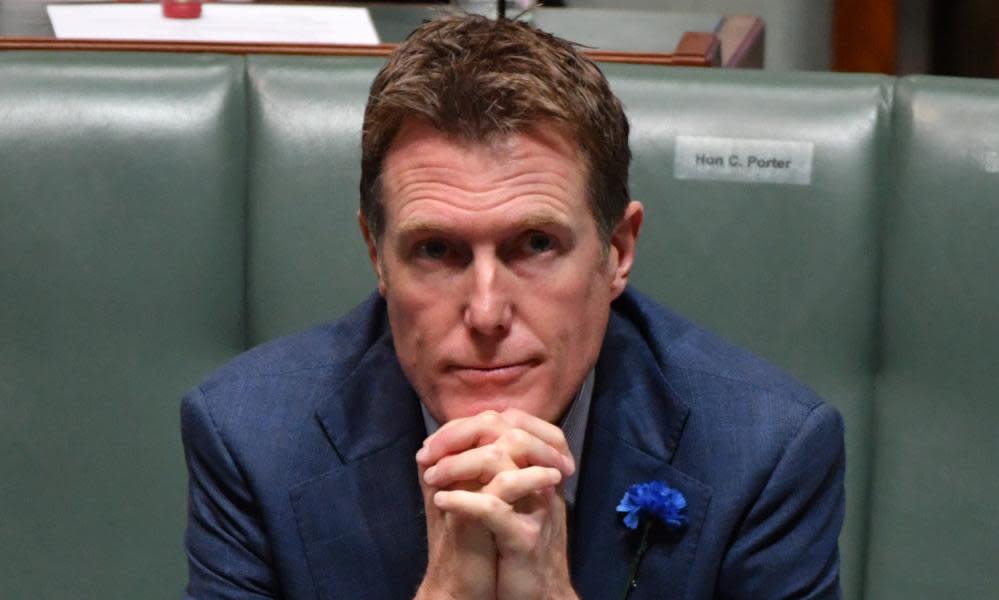Transparency expert dismisses claims MPs don’t have to declare source of gifts

Labor and transparency experts have rubbished claims that MPs and senators may not be required to declare the source of gifts, a loophole that could make further action against Christian Porter more difficult.
Porter resigned from the Morrison government ministry on Sunday, but Labor has demanded he pay back the legal fees part paid by a blind trust or else disclose the source of the funds.
Labor has decided to refer the matter to the privileges committee for a ruling and possible sanction for failing to disclose more details of the gift. But the push could be thwarted by the fact rules governing the register of MPs’ interests do not appear to explicitly require donors of gifts to be named.
Related: Barnaby Joyce backs ‘incredibly intelligent’ Christian Porter for eventual return to frontbench
MPs are required to disclose a list of “registrable interests” including “gifts valued at more than $750 received from official sources, or at more than $300 where received from other than official sources”; and “any other interests where a conflict of interest with a member’s public duties could foreseeably arise or be seen to arise”.
Explanatory notes state: “No form can cover all possible circumstances and members should consequently bear in mind the purpose and spirit of the return in deciding which matters should be registered.”
But neither those sections of the rules nor the notes specify the level of detail members must disclose, allowing a slippage over time from the normal practice of declaring a gift’s source.
As first reported by Crikey the Nationals MP and now deputy prime minister, Barnaby Joyce, declared a private charter flight from Armidale to Brisbane in May without disclosing who had given it to him, which appears to be within the rules.
Similarly on 30 July 2019 the independent MP Bob Katter declared the “use of a private aircraft from time to time, sometimes during election campaigns – probably not happening these days”.
In August 2017 Liberal MP Lucy Wicks declared “complimentary dinners on two separate occasions in July 2017, including with spouse” with a total cost of approximately $250, under the declaration threshold but with no donor disclosed.
In November and December 2017 the Labor senator Katy Gallagher lodged three updates declaring a 2008 Moët & Chandon, Kosta Boda glass bowls, a bottle of Four Pillars gin, a bottle of Perrier-Jouet champagne, a Clonakilla shiraz, cookies, chocolates and a Christmas hamper – all without donors disclosed.
A spokesperson for Gallagher said these were “valued at less than $300 each, [and] were disclosed … over and above the legislated requirements”.
Last week, Porter declared the Legal Services Trust had part paid for his legal fees in his defamation case against the ABC. He did not disclose the trustees, the amount or the source of the funds, claiming that as a potential beneficiary he had “no access to information about the conduct and funding of the trust”.
On Sunday in a statement Porter said he “understands the questions raised in the media about the financial arrangements to help fund the now settled litigation”.
“But I consider that I have provided the information required under the members’ register of interests.”
Barrister Anthony Whealy QC, the chair of the Centre for Public Integrity and former assistant commissioner to Icac, told Guardian Australia the view details of the donor were not required for the register of interests is “not justifiable”.
“The purpose of the requirement is transparency: to ensure there is not a conflict of interest or the possibility of a perception of a conflict,” he said.
“Unless you know the source of the gift or money that’s been received you can’t possibly form an opinion about it.
“Once you have that purpose in your mind it is clear that it is never sufficient to say ‘I did receive money, but I won’t say how much or who from’. That cannot possibly satisfy the criterion of transparency or revealing the conflict.”
Whealy said it was “absolutely ridiculous” Porter had accepted an anonymous gift of part payment of legal fees, and accused prime minister Scott Morrison of a “complete abrogation of responsibility” for not requiring him to disclose the source. Morrison has said this is now a matter for parliament, as Porter is no longer a minister.
Related: Christian Porter takes ‘appropriate action’ by quitting as minister, Scott Morrison says
Porter has refused to seek further information about the identity of donors, saying this would “require me to put pressure on the trust to provide me with information to which I am not entitled”.
“Some people wanted to help in that course by supporting my defamation case. They contributed to a Trust on the basis of confidentiality and a belief that their contribution would remain confidential within the rules of disclosure. Whilst I have no right of access to the funding or conduct of the Trust, on my request the Trustee provided me an assurance that none of the contributors were lobbyists or prohibited foreign entities. This additional information was provided as part of my Ministerial disclosure. No doubt the desire of some, possibly many, of those contributors to remain anonymous was driven by a natural desire to avoid the inevitable fact that for supporting me, the trial by mob would inevitably turn on them if they were identified.”
“I am not prepared to seek to break the confidentiality of those people who contributed to my legal fees.”
Labor’s shadow attorney general, Mark Dreyfus, said Porter should “stop treating this like a lawyer’s game”.
“He received up to a million dollars from one or more mysterious donors with unknown motives – which is literally thousands of times higher than the disclosure threshold,” he said.
“The register of members interests is a transparency measure. Mr Porter’s so-called disclosure has been anything but transparent.”
Guardian Australia contacted Joyce and Wicks for comment.

 Yahoo News
Yahoo News 
